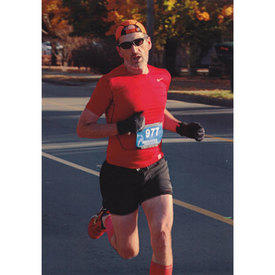running->weight loss-> increased pace
astronomicals
Posts: 1,537 Member
I did a google search on increased pace from weight loss.... I got the figure of 2 seconds faster per mile per pound lost. Anyone care to share their pace times in relation to their weight loss?
I run an 8:10 mile right now at 188#. I'll probably lose 20 pounds before I'm done cutting. Theoretically I should be able to run a 6:10 mile when I'm done.
Heres on of the articles I was looking at
http://www.runnersworld.com/weight-loss/whats-your-ideal-weight?page=single
I run an 8:10 mile right now at 188#. I'll probably lose 20 pounds before I'm done cutting. Theoretically I should be able to run a 6:10 mile when I'm done.
Heres on of the articles I was looking at
http://www.runnersworld.com/weight-loss/whats-your-ideal-weight?page=single
0
Replies
-
It's impossible to know in a real world scenario if your faster pace is the result of decreased weight, increased fitness or both. Too many uncontrolled variables.0
-
2 seconds times 20 lb is 40 seconds faster not 120. I've gotten slightly faster but not a lot.0
-
As the Carson the Wise said, you've got multiple moving variables so you can't know for sure. I'm sure it'd be a mix of less body weight to carry around, increased strength, and aerobic capacity.0
-
I've gotten a lot faster since I started running last October, but I'm going to contribute that to my training and increased fitness rather than weight loss.0
-
I ran my last half (9/28/13) 3 lbs heavier than my first (5/6/12) and I finished this race with a significantly better time/pace. 1st half marathon I weighed in at 134....ran a 1:55:27 or an 8:48 pace. 3 days ago, I weighed in at 137 and ran a 1:43:56 or a 7:56 pace. Weight is just one variable as many other, much smarter runners have already pointed out.
Train hard. You'll get results.0 -
It's impossible to know in a real world scenario if your faster pace is the result of decreased weight, increased fitness or both. Too many uncontrolled variables.
This.
I lost 30 lbs, but I was also working out a ton. I dropped at least 2 minutes per mile off my pace.0 -
I did a google search on increased pace from weight loss.... I got the figure of 2 seconds faster per mile per pound lost.
For the same V02max, a lighter person is delivering more oxygen to the muscles then a heavier person. That part of it is a linear relationship - lose half the weight, double the amount of oxygen. 300 pounds and 16 minute mile to 150 pounds and 8 minute mile wouid mean 480 seconds faster for 150 pounds lost, or roughly 3 seconds per pound.
Yeah, I suppose their number is probably in the right ballpark, although I'm not sure that in practice it'll be quite that linear.0 -
Everything else being equal you should be able to directly convert fat loss to speed -- that is assuming you don't lose muscle as well.
I've found that my 5K PRs have been matching my weight as it goes down. So when I weighed 190 I could do a 19-minute 5K and when I weighed 180 I could do an 18-minute 5K. I'm trying to get down to 175 by the end of the month, when I'm running another flat, fast, 5K, so we'll see if I can lay down a 17:30.
Of course, as Carson says, there are a million other variables. But I do think losing fat is a key component to building speed. For a LOT more info check out this book:
http://www.amazon.com/The-Rules-Marathon-Half-Marathon-Nutrition/dp/0738216453/0 -
So I should have gone slower when I went from 165lbs to 174lbs?0
-
Thx for not slamming me for messing up that simple math and keeping on the topic... I do a pretty serious strength training program and I don't plan on losing much muscle. Should be interesting to see what my final numbers are. My conditioning isn't at its best yet as I just got off recovery from an injury a month ago. Im thinking I'll be around 7:30 in 2 months. Ill check out that book Dave.0
-
So I should have gone slower when I went from 165lbs to 174lbs?
I don't think anyone is suggesting that and I feel like you're putting words in my mouth. Id expect you to do better if there was muscle gained. I'd also expect you to do better if you were not an experienced runner at 165 and have more experience now.0 -
So I should have gone slower when I went from 165lbs to 174lbs?
I don't think anyone is suggesting that and I feel like you're putting words in my mouth. Id expect you to do better if there was muscle gained. I'd also expect you to do better if you were not an experienced runner at 165 and have more experience now.
What I'm saying is, your weight has little to do with how fast you run (extreme outliers of course..). It's your cardiovascular endurance that determines this, not your weight.0 -
What I'm saying is, your weight has little to do with how fast you run (extreme outliers of course..). It's your cardiovascular endurance that determines this, not your weight.
I have to disagree with this. Weight has a lot to do with it -- especially if it's fat. Try putting on a 25-pound backpack and going for a run. I guarantee you can run faster without it. If you add 10 pounds of muscle then it might be a different story, but not if you don't simultaneously improve your cardio. This, of course, is where it gets complicated, because it would be difficult to put on 10 pounds of muscle without making some gains in cardio as well.0 -
If you want to get fast... Hill sprints, they've worked nicely for me.0
-
What I'm saying is, your weight has little to do with how fast you run (extreme outliers of course..). It's your cardiovascular endurance that determines this, not your weight.
I have to disagree with this. Weight has a lot to do with it -- especially if it's fat. Try putting on a 25-pound backpack and going for a run. I guarantee you can run faster without it. If you add 10 pounds of muscle then it might be a different story, but not if you don't simultaneously improve your cardio. This, of course, is where it gets complicated, because it would be difficult to put on 10 pounds of muscle without making some gains in cardio as well.
If I trained with that same 25 extra lbs for 6 months, I gurantee I'd be faster at the end of the 6 months, still carrying that same 25lbs than I was the first time. 0
0 -
What I'm saying is, your weight has little to do with how fast you run (extreme outliers of course..). It's your cardiovascular endurance that determines this, not your weight.
Calorie burn is primarily a function of two factors - distance, and weight. Weight absolutely, positively plays a role, because it affects power to weight ratio which affects peak speed and endurance.
All else being equal, the heavier runner/cyclist will be slower.0 -
If I trained with that same 25 extra lbs for 6 months, I gurantee I'd be faster at the end of the 6 months, still carrying that same 25lbs than I was the first time.
And you'd be even faster the moment they took the 25 pound pack off.0 -
What about short legs? They definitely slow me down. Any way to make my legs longer so I can keep up with my tall friends?0
-
What I'm saying is, your weight has little to do with how fast you run (extreme outliers of course..). It's your cardiovascular endurance that determines this, not your weight.
Calorie burn is primarily a function of two factors - distance, and weight. Weight absolutely, positively plays a role, because it affects power to weight ratio which affects peak speed and endurance.
All else being equal, the heavier runner/cyclist will be slower.
You're completely missing what I'm saying, but ok....
Yes if you're 250lbs and suddenly drop 65 lbs, yes it will be easier to move faster, but compare that same person now magically at 185 with a person at 195 with even an ounce of cardiovascular endurance/training....who's going to move faster? I'll take 195.
Weird how I was faster in college at 174 than I was at 165...0 -
What I'm saying is, your weight has little to do with how fast you run (extreme outliers of course..). It's your cardiovascular endurance that determines this, not your weight.
Calorie burn is primarily a function of two factors - distance, and weight. Weight absolutely, positively plays a role, because it affects power to weight ratio which affects peak speed and endurance.
All else being equal, the heavier runner/cyclist will be slower.
Not true....
How can an NFL running back carrying all that extra weight outrun a defensive back? 0
0 -
What I'm saying is, your weight has little to do with how fast you run (extreme outliers of course..). It's your cardiovascular endurance that determines this, not your weight.
Calorie burn is primarily a function of two factors - distance, and weight. Weight absolutely, positively plays a role, because it affects power to weight ratio which affects peak speed and endurance.
All else being equal, the heavier runner/cyclist will be slower.
Not true....
How can an NFL running back carrying all that extra weight outrun a defensive back?
Because all else isn't equal, plus they aren't running very far, plus the RB would increase speed at a lower weight. This is getting pretty silly trying to justify an argument against physics.0 -
What I'm saying is, your weight has little to do with how fast you run (extreme outliers of course..). It's your cardiovascular endurance that determines this, not your weight.
Calorie burn is primarily a function of two factors - distance, and weight. Weight absolutely, positively plays a role, because it affects power to weight ratio which affects peak speed and endurance.
All else being equal, the heavier runner/cyclist will be slower.
Not true....
How can an NFL running back carrying all that extra weight outrun a defensive back?
Because all else isn't equal, plus they aren't running very far, plus the RB would increase speed at a lower weight. This is getting pretty silly trying to justify an argument against physics.
Who said it had to be far? How isn't it equal? They went the same distance, bigger guy won. I'll ask again, how was my 40 time better at 174 vs 165 if I'm supposed to be slower?
I was a much stronger 5Ker, 10Ker, 1/2 maration, etc at 174 vs 165....I guess I'm a special snowflake.0 -
I think that weightloss would sorta be a by-product of running more I guess??0
-
I think that weightloss would sorta be a by-product of running more I guess??
Another byproduct would be....wait for it....increased cardiovascular strength.0 -
I did a google search on increased pace from weight loss.... I got the figure of 2 seconds faster per mile per pound lost. Anyone care to share their pace times in relation to their weight loss?
This is true to a certain extent but the faster you run the more resistance you're going to face from everything and it will take even more effort to run another 2 seconds faster. I'd say that weight loss is a great way to pick up some speed though.0 -
I think some of you are forgetting a few things. First it depends on how you are training, how long you have been running, weight does have a factor but its not everything. I weigh anywhere from 197 - 201 and I am 51 years old. 2 weeks ago I ran a 5k with a 6:53 pace and I beat both smaller and bigger people, I finshed 16th out of 478 so even though I am bigger I can still out run smaller people because of how I train. This past weekend I did a duathlon and finished 3rd overall again beating smaller athletes, ran the first mile in 5:49 and had the 2nd fastest bike speed in the race.
My point is there are a whole lot of factors that go into it not just weight, training , technique and a whole lot of heart goes a long way as well0 -
It's almost like you're saying that running leads to weight loss... AND increased pace?????I think that weightloss would sorta be a by-product of running more I guess??
Another byproduct would be....wait for it....increased cardiovascular strength.
Are you sure doing one thing can do more than one thing for you????0 -
I think some of you are forgetting a few things. First it depends on how you are training, how long you have been running, weight does have a factor but its not everything. I weigh anywhere from 197 - 201 and I am 51 years old. 2 weeks ago I ran a 5k with a 6:53 pace and I beat both smaller and bigger people, I finshed 16th out of 478 so even though I am bigger I can still out run smaller people because of how I train. This past weekend I did a duathlon and finished 3rd overall again beating smaller athletes, ran the first mile in 5:49 and had the 2nd fastest bike speed in the race.
My point is there are a whole lot of factors that go into it not just weight, training , technique and a whole lot of heart goes a long way as well
^^The point i'm making, but hey, I guess you should cut down to like 180-185...you'll be faster.0 -
I think that weightloss would sorta be a by-product of running more I guess??
Not necessarily. You need a deficit to lose weight. It is entirely possible to run and not end up in a deficit. BTDT.0 -
I have found over the years that my pace increases when I am actively building muscle in my legs. If all I do is lose weight, my run times typically don't come down. If I am engaged in a strength training program that incorporates interval training (Mark Lauren's You Are Your Own Gym), my times decrease significantly.
Just my 2 cents.0
This discussion has been closed.
Categories
- All Categories
- 1.4M Health, Wellness and Goals
- 398.1K Introduce Yourself
- 44.7K Getting Started
- 261K Health and Weight Loss
- 176.4K Food and Nutrition
- 47.7K Recipes
- 233K Fitness and Exercise
- 462 Sleep, Mindfulness and Overall Wellness
- 6.5K Goal: Maintaining Weight
- 8.7K Goal: Gaining Weight and Body Building
- 153.5K Motivation and Support
- 8.4K Challenges
- 1.4K Debate Club
- 96.5K Chit-Chat
- 2.6K Fun and Games
- 4.8K MyFitnessPal Information
- 18 News and Announcements
- 21 MyFitnessPal Academy
- 1.5K Feature Suggestions and Ideas
- 3.2K MyFitnessPal Tech Support Questions














